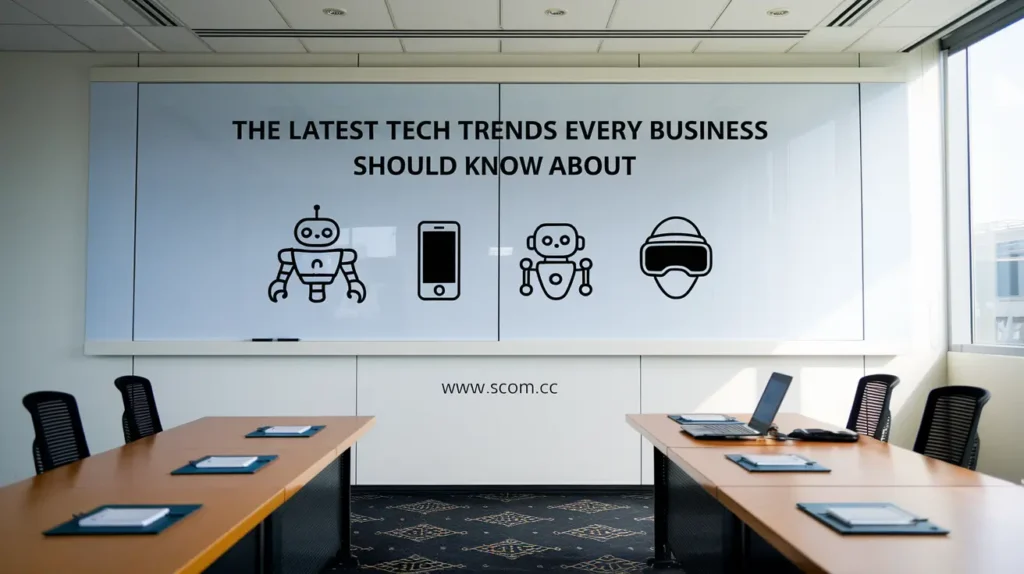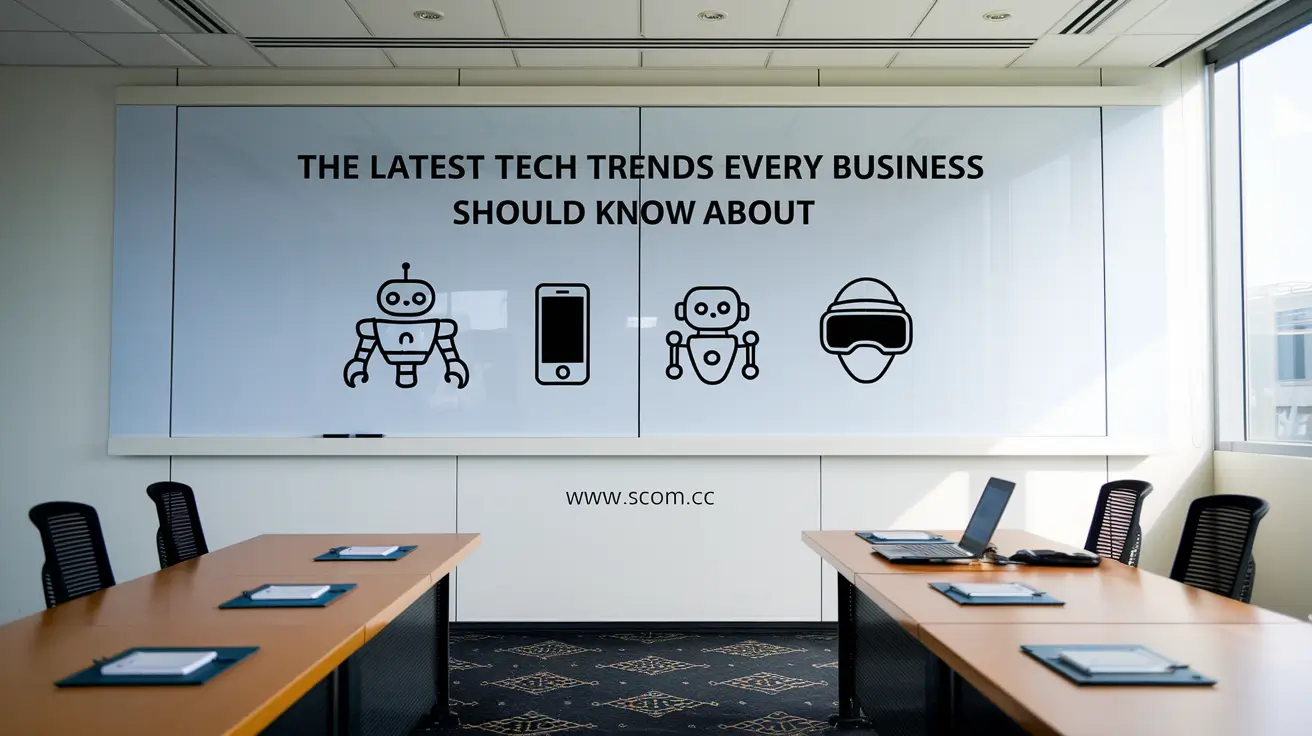The Latest Tech Trends Every Business Should Know About

- The Latest Tech Trends Every Business Should Know About
- Artificial Intelligence (AI) and Machine Learning (ML)
- Blockchain Technology
- Internet of Things (IoT)
- Cloud Computing
- 5G Technology
- Augmented Reality (AR) and Virtual Reality (VR)
- Cybersecurity Advances
- Automation and Robotics
- Data Analytics and Big Data
- Digital Transformation
-
FAQ
- What is artificial intelligence (AI)?
- How can blockchain technology benefit businesses?
- What are some common applications of IoT in business?
- What advantages does cloud computing offer?
- How does 5G technology impact businesses?
- What are the benefits of augmented reality (AR) and virtual reality (VR) for businesses?
- How can businesses use data analytics to drive growth?
The Latest Tech Trends Every Business Should Know About
Artificial Intelligence (AI) and Machine Learning (ML)
Artificial Intelligence (AI) and Machine Learning (ML) are transforming the business landscape by enabling more intelligent data processing and automation. These technologies are driving efficiencies, enhancing customer experiences, and creating new business opportunities.
What is AI and ML?
- Artificial Intelligence (AI): Refers to systems or machines that simulate human intelligence to perform tasks and can iteratively improve themselves based on the information they collect.
- Machine Learning (ML): A subset of AI, ML involves the use of algorithms and statistical models that enable computers to learn from and make predictions or decisions based on data.
Applications in Business
- Customer Service: AI-powered chatbots and virtual assistants provide 24/7 support, handling inquiries, and resolving issues with increasing accuracy.
- Personalization: ML algorithms analyze customer data to deliver personalized recommendations and targeted marketing.
- Predictive Analytics: AI models forecast trends and customer behavior, helping businesses make data-driven decisions.
Benefits
- Enhanced Efficiency: Automates repetitive tasks, allowing employees to focus on more strategic activities.
- Improved Decision-Making: Provides actionable insights from large volumes of data.
- Cost Savings: Reduces operational costs through automation and optimized resource allocation.
Blockchain Technology
Blockchain technology, initially developed as the backbone for cryptocurrencies, is now finding applications across various industries. It offers a secure, transparent, and decentralized way to manage transactions and data.
What is Blockchain?
Blockchain is a distributed ledger technology that records transactions across multiple computers in a way that ensures the security and transparency of the data.
Applications in Business
- Supply Chain Management: Enhances transparency and traceability of goods, reducing fraud and errors.
- Smart Contracts: Automates and enforces contract agreements without the need for intermediaries.
- Secure Transactions: Provides a secure platform for financial transactions, reducing the risk of fraud.
Benefits
- Increased Security: Offers a high level of security through encryption and decentralization.
- Transparency: Provides a transparent and immutable record of transactions.
- Efficiency: Reduces the need for intermediaries and accelerates transaction processes.
Internet of Things (IoT)
The Internet of Things (IoT) refers to the interconnected network of physical devices that collect and exchange data. IoT is driving innovation in various sectors, including manufacturing, healthcare, and logistics.
What is IoT?
IoT involves embedding sensors and connectivity into physical objects, enabling them to collect and transmit data over the internet.
Applications in Business
- Smart Manufacturing: Uses IoT sensors to monitor equipment performance, predict maintenance needs, and improve production efficiency.
- Fleet Management: Tracks and manages vehicle fleets in real-time, optimizing routes and reducing operational costs.
- Smart Buildings: Controls and optimizes building systems, such as heating, lighting, and security, to enhance efficiency and reduce costs.
Benefits
- Improved Efficiency: Optimizes processes and resource usage through real-time data collection and analysis.
- Enhanced Customer Experience: Provides personalized and responsive services based on data from connected devices.
- Cost Savings: Reduces operational costs through predictive maintenance and optimized resource management.
Cloud Computing
Cloud computing allows businesses to access and manage computing resources over the internet, providing flexibility, scalability, and cost savings. It has become a fundamental technology for modern enterprises.
What is Cloud Computing?
Cloud computing delivers computing services—such as servers, storage, databases, networking, and software—over the internet (the cloud), allowing businesses to scale resources as needed.
Applications in Business
- Data Storage: Provides scalable and secure storage solutions for data and applications.
- Collaboration Tools: Facilitates remote work and team collaboration through cloud-based applications and services.
- Software as a Service (SaaS): Offers access to software applications on a subscription basis, reducing the need for on-premises installations.
Benefits
- Scalability: Allows businesses to scale resources up or down based on demand.
- Cost Efficiency: Reduces capital expenditure on hardware and software, transitioning to a pay-as-you-go model.
- Accessibility: Enables access to data and applications from anywhere with an internet connection.
5G Technology
5G technology represents the next generation of mobile network connectivity, offering faster speeds, lower latency, and increased capacity. It is poised to drive innovation across various industries.
What is 5G?
5G is the fifth generation of mobile network technology, providing higher data speeds, lower latency, and more reliable connections compared to previous generations.
Applications in Business
- Enhanced Mobile Connectivity: Improves mobile internet speeds and reliability, supporting data-intensive applications.
- Smart Cities: Enables the development of smart city infrastructure, including connected transportation and public services.
- Remote Work and Collaboration: Supports high-quality video conferencing and real-time collaboration tools.
Benefits
- Faster Speeds: Provides significantly faster data transfer speeds, enhancing user experience and productivity.
- Lower Latency: Reduces the delay in data transmission, improving the performance of real-time applications.
- Increased Capacity: Supports a higher number of connected devices and simultaneous connections.
Augmented Reality (AR) and Virtual Reality (VR)
Augmented Reality (AR) and Virtual Reality (VR) technologies are transforming the way businesses interact with customers and manage operations. They offer immersive experiences and innovative solutions for various applications.
What are AR and VR?
- Augmented Reality (AR): Overlays digital information onto the real world, enhancing the user’s perception of their environment.
- Virtual Reality (VR): Creates a completely immersive digital environment that users can interact with using VR devices.
Applications in Business
- Retail and E-commerce: Provides virtual try-on experiences and interactive product demonstrations.
- Training and Simulation: Offers immersive training programs and simulations for various industries, including healthcare and manufacturing.
- Marketing and Advertising: Enhances marketing campaigns with interactive and engaging AR and VR experiences.
Benefits
- Enhanced Engagement: Creates immersive and interactive experiences that capture user attention.
- Improved Training: Provides realistic training scenarios, enhancing learning and skill development.
- Innovative Marketing: Differentiates brands through unique and engaging marketing experiences.
Cybersecurity Advances
As cyber threats become more sophisticated, businesses need to adopt advanced cybersecurity measures to protect their data and systems. Innovations in cybersecurity are crucial for safeguarding against breaches and attacks.
Key Cybersecurity Innovations
- Advanced Threat Detection: Uses AI and ML to identify and respond to emerging threats in real time.
- Zero Trust Architecture: Adopts a security model that assumes threats could be internal or external and requires continuous verification of users and devices.
- Blockchain Security: Utilizes blockchain technology to enhance the security of transactions and data integrity.
Applications in Business
- Data Protection: Secures sensitive data from unauthorized access and breaches.
- Network Security: Protects network infrastructure from attacks and vulnerabilities.
- Incident Response: Provides tools and strategies for responding to and mitigating cyber incidents.
Benefits
- Enhanced Protection: Improves the ability to detect and prevent cyber threats.
- Reduced Risk: Minimizes the risk of data breaches and financial losses due to cyberattacks.
- Compliance: Helps businesses meet regulatory requirements for data security and privacy.
Automation and Robotics
Automation and robotics are revolutionizing various industries by streamlining processes, improving accuracy, and reducing labor costs. They are integral to modernizing operations and enhancing productivity.
What is Automation and Robotics?
- Automation: Involves using technology to perform tasks with minimal human intervention.
- Robotics: Involves the use of robots to carry out tasks, often in manufacturing and logistics.
Applications in Business
- Manufacturing: Automates repetitive tasks, improving production efficiency and quality.
- Logistics and Warehousing: Uses robots and automated systems for sorting, packing, and managing inventory.
- Customer Service: Implements automation for handling routine customer inquiries and transactions.
Benefits
- Increased Efficiency: Reduces the time and cost associated with manual tasks.
- Improved Accuracy: Enhances precision and consistency in operations.
- Cost Savings: Lowers labor costs and operational expenses through automation.
Data Analytics and Big Data
Data analytics and big data technologies enable businesses to analyze vast amounts of data to gain insights, make informed decisions, and drive growth. These technologies are essential for leveraging data effectively.
What are Data Analytics and Big Data?
- Data Analytics: Involves examining data to uncover patterns, correlations, and insights that inform decision-making.
- Big Data: Refers to extremely large data sets that require advanced tools and techniques to process and analyze.
Applications in Business
- Customer Insights: Analyzes customer data to understand behavior, preferences, and trends.
- Operational Efficiency: Uses data to optimize processes, reduce costs, and improve performance.
- Market Research: Provides insights into market trends, competitive landscape, and consumer needs.
Benefits
- Informed Decision-Making: Enables data-driven decisions based on comprehensive analysis.
- Enhanced Performance: Improves operational efficiency and effectiveness through data insights.
- Competitive Advantage: Provides insights that can lead to innovative strategies and market opportunities.
Digital Transformation
Digital transformation encompasses the integration of digital technologies into all aspects of business operations, fundamentally changing how businesses operate and deliver value to customers.
What is Digital Transformation?
Digital transformation involves leveraging digital technologies to transform business processes, customer experiences, and organizational structures to drive growth and efficiency.
Applications in Business
- Process Optimization: Automates and improves business processes using digital tools and technologies.
- Customer Experience: Enhances customer interactions and engagement through digital channels and solutions.
- Business Model Innovation: Develops new business models and revenue streams enabled by digital technologies.
Benefits
- Increased Agility: Enables businesses to adapt quickly to changing market conditions and customer needs.
- Enhanced Customer Experience: Improves customer satisfaction and loyalty through personalized and efficient services.
- Operational Efficiency: Streamlines operations and reduces costs through digital tools and automation.
FAQ
What is artificial intelligence (AI)?
Artificial Intelligence (AI) refers to the simulation of human intelligence by machines, enabling them to perform tasks such as learning, reasoning, and problem-solving.
How can blockchain technology benefit businesses?
Blockchain technology provides enhanced security, transparency, and efficiency by creating a decentralized and immutable record of transactions.
What are some common applications of IoT in business?
Common applications of IoT in business include smart manufacturing, fleet management, and smart building management, which leverage connected devices to improve efficiency and decision-making.
What advantages does cloud computing offer?
Cloud computing offers scalability, cost efficiency, and accessibility by providing on-demand computing resources over the internet, reducing the need for on-premises hardware and software.
How does 5G technology impact businesses?
5G technology impacts businesses by providing faster internet speeds, lower latency, and increased capacity, enabling improved mobile connectivity, smart city development, and enhanced remote work capabilities.
What are the benefits of augmented reality (AR) and virtual reality (VR) for businesses?
AR and VR technologies offer enhanced engagement, improved training, and innovative marketing opportunities by creating immersive and interactive experiences for users.
How can businesses use data analytics to drive growth?
Businesses can use data analytics to gain insights into customer behavior, optimize operations, and inform strategic decisions, leading to improved performance and competitive advantage.

If you enjoyed this article and found it valuable, we encourage you to explore our news and valuable information section, where you'll find more relevant and up-to-date content that may pique your interest. Additionally, if you are seeking advice or need guidance on a specific topic, we suggest visiting our services section. There, you will find a variety of options designed to assist and support you in addressing your needs. Feel free to check out both sections to get the information and assistance that best suits your requirements.

Leave a Reply